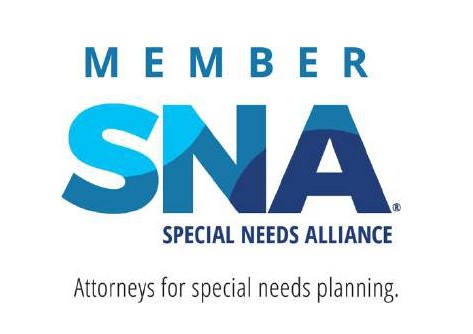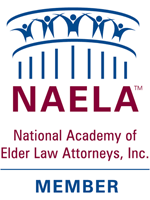This page answers many of the common questions received at the law office of Ruthann P. Lacey, P.C. If you have a question that does not appear below, please email us or contact us at the address below, and we will respond as soon as we are able. (Please click on each question to make the area expand.)
As a practice specialty, Elder and Special Needs Law is characterized less by what it is than by who it serves. The practice of Elder Law is a general one which is dedicated to the unique and often complex planning concerns of disabled individuals, the senior population, and their adult children. These concerns typically involve one or more of the following legal areas:
- Estate and Tax Planning
- Wills, Probate and Estate Administration
- Revocable and Irrevocable Trusts
- Special Needs Trusts
- Durable Financial Powers of Attorney
- Durable Medical Powers of Attorney
- Real Property
- Guardianship
- Living Wills
- Health Law
- Independent Living Options
- Nursing Home Issues
- Financing Long-Term Healthcare
- Medicare, Medicaid, and SSI Issues
The typical Elder Law client is either the disabled or senior individual who is planning for his own current or future circumstances, or the person assisting in that endeavor on behalf of a close family member or friend.
In the absence of informed counsel, it is not uncommon for planning efforts taken on behalf of older or disabled persons — even with seemingly “simple” affairs — to have unintended significant legal side effects. An experienced Elder Law Attorney can competently guide you toward meeting your objectives while avoiding the unforseen pitfalls which often plague the unwary.
Matters routinely addressed by and Elder Law Attorney include assisting individuals with the following:
- Assessing the client’s circumstances considering federal tax, social security, Medicare, Medicaid, SSI laws, and state property laws, and recommending the best course of action in accordance with these laws.
- Drafting trusts, wills, and other documents to ensure that the senior or disabled individual’s wishes are carried out even if he or she is not able to provide personal direction at some future time.
- Determining the best method of paying for long-term health care, and taking the steps necessary to implement that plan.
- Arriving at difficult decisions regarding matters such as end-of-life issues, the continued independence of the senior or disabled individual, and financial matters.
- Establishing a means for keeping financial and medical decision making within the family, thereby avoiding the need for guardianship.
Ms. Lacey brings more to her practice than mere expertise in the appropriate areas of law. She brings a holistic understanding of the senior or disabled clients’ special concerns, as well as extensive experience assisting clients with the real-life problems that individuals tend to encounter as they age.
Whether you are presently facing a family crisis, or are simply taking advantage of advance planning, Ms. Lacey can lend guidance in sorting through the issues and apprise you of your options. This will afford you the confidence and peace of mind that follows when you have adequately and optimally planned for your circumstances.
Further, Ms. Lacey is committed to the belief that every person should be encouraged to make decisions and maintain their independence as long as is safely and reasonably possible. Yet she has a thorough appreciation for the physical, emotional, and cognitive health care challenges that frequently accompany the aging process. In response, she can refer you to a network of physicians, social workers, financial advisors, care managers, and other elder care professionals who might also assist you or your loved one. This service underscores her thorough and unsurpassed commitment to complete client service.
Value.
Every appointment is a “working” appointment. Because each situation is different and merits a complete review of all of the relevant facts and circumstances before advice can be rendered, the client gains individually tailored legal advice, guidance, direction, and, if appropriate, referrals to other service providers. At the conclusion of the appointment, the client receives an Action List which clearly and specifically indicates the next steps that Ms. Lacey recommends be taken by or on behalf of the client.
Assurance of quality, service, and timeliness. At theconclusion of each appointment, the client knows exactly what to expect from Ms. Lacey, knows what the costs are, and is provided an estimated completion date for any additional services that have been requested.
Convenience. Ms. Lacey’s office is conveniently located in the Northlake area near Atlanta. Appointment times are scheduled during normal business hours. Personal checks, Visa and MasterCard are accepted.
Responsiveness. Ms. Lacey’s staff attempts to answer all phone calls personally, and, when unavailable, return them promptly. A confidential voice mail system is in place to take your message when either a paralegal or Ms. Lacey are unable to take your call personally.
Why should I complete the Client Information Forms?
It is our goal to provide comprehensive long term planning for our clients. In order to accomplish this, we need to have a full understanding of the client’s objectives, health situation, family relationship, and assets. Relying on this information the attorneys can then provide substantive and accurate advise to the client that will ultimately enable him to achieve his objectives.Part of this long term planning may involve drafting legal documents such as a Last Will and Testament, a Trust, or a Durable Financial Power of Attorney. In order to ensure that specific assets will then be controlled by the Will, the Trust, or the Power of Attorney (and to address potential tax issues), it is essential that we know what those assets are, how they are titled, and the approximate value of each. Without accurate and complete information it would be impossible for the attorneys to do a thorough job upon which the client could rely, and it would be foolish of us to try.
Please be assured that at the Law Office of Ruthann P. Lacey, P.C. we treat all information disclosed on Client Information Forms with the utmost confidentiality as is required by our professional and personal standards of conduct.
What are Ms. Lacey’s Qualifications?
Ms. Lacey has been a legal professional for over fifteen years. She is a Certified Elder Law Attorney (CELA), and is a member of the National Academy of Elder Law Attorneys (NAELA), the Special Needs Alliance, the Trust and Health Care Decision Making Special Interest Groups of NEALA, and the District of Columbia and State of Georgia Bar Associations.She is past co-chair of the Elder Law Committee and belongs to the Real Property and Fiduciary Law Sections of the Georgia Bar. She belongs to the DeKalb Estate Planning Council, serves as Trustee on the board of The Community Trust, and is a Professional Affiliate for the Georgia Chapter of the Huntington’s Disease Society.
Ms. Lacey is an active speaker on the local, state, and national levels, both to public and professional organizations. She has presented at the Institute of Continuing Legal Education in Georgia, the People’s Law School, Alzheimer’s support groups, and AARP Chapters. Additionally, Ms. Lacey has been an Instructor of Estates, Trusts, and Wills at the National Center for Paralegal Training.
Ms. Lacey has drafted Elder Law legislation for submission to the Georgia General Assembly, and is a published writer. Among other accomplishments, she has appeared as a guest on the Clark Howard Show and the Lawman’s Lawyer, has written for the newsletter Money Matters, is a regular resource to the Atlanta Journal and Constitution, and has been quoted inSouthern Lifestyles and the American Bar Association Journal.
What is a Certified Elder Law Attorney?
A CELA is an attorney who has the enhanced knowledge, skills, experience, and proficiency to be properly identified to the public as a certified elder law attorney. The National Elder Law Foundation administers the certification program. The criteria for certification include the following:
- Having practiced law for at least five years
- Remaining in good standing with all of the bars where licensed
- Showing substantial involvement and experience in practicing elder law
- Completion of a minimum of 45 hours of continuing legal education in elder law during the preceeding three years
- Favorable references of five attorneys
- Passing a written certification examination
As such, the time, effort, and expense that attorney Ruthann P. Lacey has dedicated to become certified is evidence of her commitment to excellence in the practice of Elder Law.
How can I Contact Ms. Lacey or her Staff?
PO Box 451167
Atlanta, GA 31145
Phone: (770) 939-4616
Fax: (770) 939-1758
Email: moc.yecalwalredlnull@ofni




